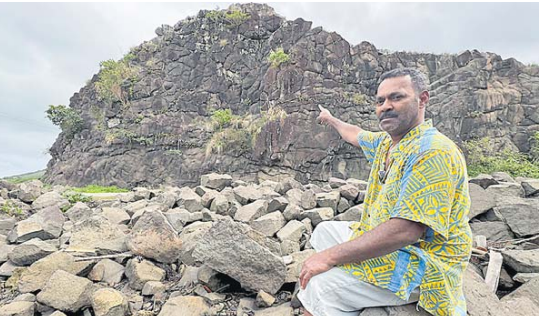VILLAGERS of Nukutocia in Ovalau have expressed serious concerns about extraction activities taking place near their village, claiming it has now left them more exposed and vulnerable to natural disasters.
Village headman Maikeli Tamani said while the establishment of a quarry next to the village was well-intended, it had come at a cost to them.
“This rock wall has always served as a cover for us — a natural wind barrier from strong winds and cyclones,” he said.
“This is what our ancestors relayed to us, and we ourselves have seen the advantages of having this structure in place. “But over the years, we have noticed a difference, particularly with the cyclones we’ve experienced before and after the extraction works.”
Mr Tamani said quarrying first began at the site about 19 years ago when rock boulders were needed for development works at the Pacific Fishing Company, or PAFCO, in Levuka.
“When coastal erosion became a serious issue around the island, and waves severely damaged the circular road, which is flooded often, it was decided that extraction works for gravel and more rock boulders would take place here to try and solve that issue.
“We noticed a change during Cyclone Winston – we were more exposed to strong winds because there’s a gap now in that wall.”
Mr Tamani also raised the question of fair compensation. “While the mataqali that leased the land benefited from it, the rest of us are subjected to the noise and dust that come from the quarry. “We’ve also become more vulnerable to cyclones, and I believe the Government needs to consider this and consider compensating everyone because we’re all affected.”
In June 2022, the Fiji Environmental Law Association and Environmental Defenders Office Australia visited Ovalau to conduct community consultations on the impacts of climate change.
The Association highlighted the plight of the Nukutocia villagers, raising concerns also at the time about the runoff and silt accumulating in the coastal front, which had destroyed the sea grass and marine life. Inoke Tokalau of the mataqali Salili, on which the quarry is located, said the discussions about the extraction site created much debate.
“Not everyone in the village was in agreement with this decision, but our mataqali decided to sign the lease for the quarry because we knew it would benefit the whole island, especially with the constant flooding and destruction of the roads,” he said.
When approached for comments, the Fiji Roads Authority said consultations had been conducted prior to the quarry project. “FRA takes these concerns very seriously. Before the quarry project began, we conducted community consultations to ensure everyone understood the plans and potential impacts.
“The project only proceeded after landowners gave their consent. We also carried out a formal Environmental Impact Assessment (EIA) to ensure the work was done responsibly and with minimal impact to the surrounding environment.”
FRA said the quarry had been “a major win” for Ovalau, supporting works designed to protect both the shoreline and roads from rising sea levels and storm surges by placing large rock barriers along the coast. “FRA has saved a significant amount by not having to ship materials from Viti Levu.
“This has not only reduced transport costs but also allowed us to respond more quickly to maintenance needs and invest those savings back into local road improvements.”

